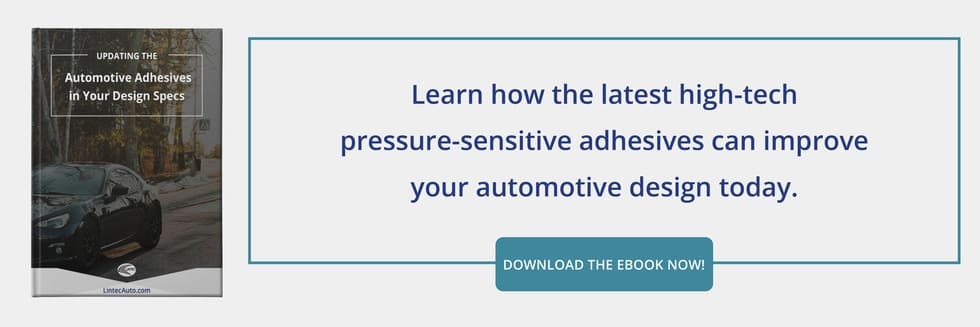Mechanical fasteners are no longer an absolute, all-situations requirement for building effective components in Tier 1 auto parts supply. More and more engineers are identifying opportunities to select today’s long-lasting and high-tensile-strength automotive adhesives over heavier, louder, more expensive mechanical fastening solutions. This can sometimes make for elegant, uninterrupted surfaces in auto design.
That said, the potential and power of automotive adhesives go far beyond design. The right solutions lead to lighter, more efficient vehicles that are actually more rigid than those speckled with welds and rivets — and better able to withstand increasing demands for automotive performance.
Addressing Mechanical Fastener Challenges for Automotive Industry
Rivets, screws, clips, and bolts have faced disruptions in the automotive manufacturing supply chain in recent years. The rising cost of raw materials, ongoing labor shortages of skilled workers, and environmental concerns make it increasingly difficult to source and install quality parts at scale.
Aside from supply chain disruptions, mechanical fasteners are also aging out as effective fixatives for vehicles. Bolts, screws, and rivets are heavy, corrosive, and harder to maintain, which makes them less desirable to automotive engineers in the age of mixed-material EVs comprised of aluminum, composite, and plastics. These vehicles must also find fresh ways to mitigate the weight of heavy EV batteries.
Leading manufacturers have turned to automotive adhesives to streamline supply chains, augment vehicle designs, and lightweight vehicles to improve fuel economy.
Alternatives to Mechanical Fasteners in Tier 1 Auto Parts Supply
Automotive adhesives are an effective fixative replacement in an increasingly uncertain mechanical fastener supply chain. There are several different types of adhesives available, each of which addresses challenges in attaching paneling, parts, and more.
These include:
- Liquids
- Foams
- Sprays
- Decorative
- Double-Sided
- Single-Sided
- Films
- Industrial Tapes
- Structural
- Protective
Applications of Adhesives in the Automobile Supply Chain
Accessible, efficient, high-quality automotive adhesives offer greater versatility with fewer limitations than the mechanical fastening solutions of old. Vehicle engineers have near-limitless use cases with the right adhesives in hand, such as:
Lightweighting
Adhesives assist in automotive lightweighting, which is a major challenge as fuel efficiency requirements continue to increase. Industry experts such as Grand View Research suggest automotive adhesives could greatly improve vehicle fuel consumption rates.
Reduced Maintenance
Unlike traditional mechanical fasteners, adhesives require no ongoing maintenance. For example, adhesives such as vibration damping tape are resistant to galvanic corrosion and withstand extreme temperatures and weather patterns.
High Accessibility
Some mechanical fasteners take up to 26 weeks to package, ship, and deliver. Automotive adhesive lead times are much more competitive — the product is lighter, simpler, and more readily accessible.
Benefits of Adhesives For Tier 1 Automotive Supply Professionals
Compared to the mechanical fasteners of yesteryear, automotive adhesives come with a long list of benefits.
These include:
Greater Design Flexibility
Studies show that structural adhesives cut factory spot welding by up to 50%. This cuts as much as 22 pounds of metal from the vehicle, which assists with lightweighting and creates flexibility in design options.
Freedom to Mix Materials
Automotive adhesives join disparate materials that are otherwise incompatible with traditional fasteners. This allows engineers to address unweldable joints and suboptimal substrates for screws, resulting in a more efficient design overall.
Rugged and Durable
Many automotive adhesives ace NHV ratings by reducing rattling, wind, and other residual noises in the vehicle cabin. Others are designed to withstand extreme temperatures and UV rays, which greatly extends the life of the vehicle.
Address Automotive Industry Challenges with Vehicle Adhesives from LINTEC Automotive
Adhesives are certainly not a new development in the automotive industry supply chain, but as shortages and disruptions continue to plague the mechanical fasteners industry, finding the right automotive adhesive supplier matters more than ever.
Building stronger relationships with key suppliers and strategic vendors can help ease your reliance on traditional mechanical fasteners. The best providers should offer a diverse range of products to meet and exceed ongoing manufacturing needs.
You can discuss your requirements with an automotive adhesive supplier and discover how dozens of companies have eliminated mechanical fasteners from their auto parts chain.

